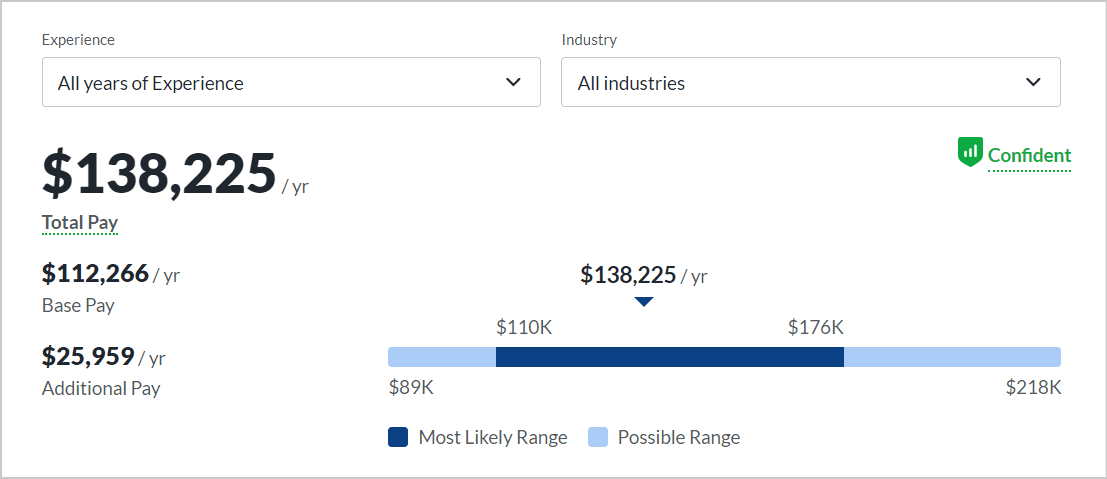
How Much Do Software Engineers Make in California? [Guide]
Home to Silicon Valley, California is one of the biggest technology hubs in the world and offers great opportunities for software engineers. With the right combination of skills and experience, California programmers can earn up to $300,000 a year.
Understanding what skills and job titles are considered the most valuable is essential to maximize your earning potential. In this guide, we’ll bring together salary data by role, company, and experience level so you can see exactly what you need to do to start earning more as a software engineer in California.
Is It Hard To Land a Software Engineering Job in California?
There are more than 54,000 tech businesses based in California and it’s often considered the tech hub of the world. This means that there are lots of opportunities, but there’s also lots of competition. If you have a strong network of people you can call on to find openings and referrals, you’re likely to get work quickly. If you don't have a network, you might find yourself losing out to the candidates who do.
California Coding Salaries in the News
Because of recent legislation passed in Colorado, Washington, California, and New York City, salary information on job postings has become far more common. Since 2020, the percentage of jobs with salary information provided by the employer has risen from 16% to 43.7%. The primary aim of these requirements is to combat pay disparities, and this information is useful for all job seekers.
Highest Paying Software Engineer Job Titles

Keep in mind that salaries for the job titles listed below vary depending on an employee’s level of education, relevant work experience, and certifications, as well as an employer’s industry and company size.
Software Engineer
Average Salary: $138,225

Software engineers are skilled professionals with knowledge of programming languages and software development. They might be hired to work on projects involving computer software, games, or mobile applications.
Full-Stack Developer
Average Salary: $97,014

A full-stack developer is someone who is proficient in two other software engineering specialties: front-end and back-end development. Basically, this is someone who can create an entirely functional program themselves because they know how to write all of the complex, underlying code, as well as develop the user interface.
Data Scientist
Average Salary: $148,553

Data scientists develop software to analyze large amounts of data, synthesize the data into usable metrics, and build predictive models for their company.
DevOps Engineer
Average Salary: $149,311

DevOps (development and operations) engineers are the “go-betweens” for the developmental and operational sides of software development. Their job is to communicate problems, solutions, and goals between these two branches.
Principal Software Engineer
Average Salary: $227,974

“Principal software engineer” is the highest-ranking title for software engineers. Their job is to oversee everything in a company’s software engineering department.
Software Architect
Average Salary: $197,971

Software architects are responsible for building frameworks and high-level designs for a software project.
Senior Web Developer
Average Salary: $149,129

Web developers are responsible for creating and maintaining websites for their clients. They write code, troubleshoot problems, monitor website traffic, and make sure the website can handle its traffic. Senior web developers oversee teams of junior web developers.
Game Developer
Average Salary: $87,741

Game developers are software engineers that work specifically on video games for PC, console, and mobile platforms. They’re usually proficient in languages like C++ and C# or Javascript for web games. While some game developers work mainly with in-house engines, you may also see job postings for engine-specific developers like Unity developers or Unreal developers.
Back-End Developer
Average Salary: $94,932

These professionals design and maintain the inner workings of websites and applications, dealing with features like databases, security, and servers. They make sure user data is stored safely and that online orders and secure payments are sent to the right place.
High-Paying Companies for Software Engineers in California
Since California is home to the biggest tech companies in the world, you’re likely to be familiar with many of these names.
Meta

Source: Glassdoor
Meta (formerly known as Facebook) is a media and tech conglomerate currently developing VR and Metaverse tech. They’re particularly interested in software engineers with expertise in machine learning.
Amazon

Source: Glassdoor
Amazon is now one of the biggest names in online retail and is looking for full-stack software development engineers, particularly in the realm of customer experience.
Netflix

Source: Glassdoor
Netflix is a media and streaming company that both develops and distributes films and TV shows. They’re now looking for a software engineer that can collaborate across multiple departments.
Discord

Source: Glassdoor
Discord is a social messaging and voice communication platform originally aimed at the gaming community. It’s home to a wealth of niche communities, from language learning groups to official tech company Q&A servers.
Apple

Source: Glassdoor
Apple is a tech giant famous for its phones, tablets, laptops, desktops, and smartwatches. And they need software engineers to help build the systems that run on all of those devices!
Skills Needed for High-Paying Software Jobs
If you want to earn high compensation as a software engineer in California, there are many skills and experiences you need to develop. Here are some examples:
Multiple programming languages
High-level debugging skills
Product vision (developing a sense of the bigger picture of your project)
Excellent interpersonal skills
People management skills (many of the highest-paying roles are managerial positions)
Entry-Level Programming Jobs in California

Software engineering is a great field for juniors because there are always low-level tasks to complete and therefore always entry-level positions available. You don’t need to aim for the best job you can find right away because low-level jobs often include a variety of responsibilities that really help to educate juniors and turn them into the principal engineers of tomorrow.
Junior Software Engineer

Source: Glassdoor
As a junior at a software company, you will find yourself with a lot of debugging and optimization tasks and a lot of learning opportunities through working with seniors and attending meetings.
Junior Game Developer

Source: Glassdoor
When you enter a game studio as a junior, you won’t work on the most exciting parts of the game—perhaps you’ll start by working on the map or environmental features—but you will learn a lot about the game development process.
How To Become a Software Engineer in California

There are multiple paths to this career and software engineering is known for its focus on demonstrable skills, rather than education and experience. Many engineers in senior positions now only started their learning journey in their late 20s or early 30s. Let’s look at a few different ways to approach this.
No Experience
Gain the skills. If you haven’t joined the workforce yet, you potentially have a lot of free time you can dedicate to studying. To prepare for a career in software engineering, you can take a college or community college course in computer science, enroll in online courses and bootcamps, or even study independently.
Develop a portfolio. Putting your skills to use is something you should start doing as soon as you’re able. Whether it’s personal projects, open-source projects, guided projects, volunteer projects, or freelance work, it’s essential to develop a portfolio of work you can show to employers to showcase your skills.
Find a job. Searching for your first full-time role will be full-time work in itself. You need to leverage the network you’ve started to build, pay attention to job sites, and reach out to specific companies you’re interested in.
Career Transition
Gain the skills. If you’re already a full-time worker, learning a new set of skills will have to be done in your spare time. This means you can’t attend a full-time university course but you can attend a night school or enroll in a part-time online bootcamp.
Develop a portfolio. You can also do your extra-curricular work from home and on a weekend by participating in a range of volunteer, open-source, and freelance projects. It’s important to engage in project work as early and as often as possible so your skills improve and your most recent projects can make up an impressive portfolio.
Find a job. Software engineering roles are everywhere, not just in tech-based companies. Whether you’re from a related career or not, you can begin your job search by reaching out to your network and searching for openings and referrals. You’ll also need to keep an eye on job board sites and reach out to individual companies.
Click here to learn more and apply for UMG’s software engineering bootcamp today and start your successful career in a matter of months!
Where Should You Look for Jobs?
There are lots of different job boards available to help with your search, including ones specific to tech positions in California.
FAQs about Software Engineering Salaries in California
We’ve got the answers to your most frequently asked questions:
Is software engineering a good career in California?
California is the highest-paying state in the United States for software engineers and is home to the world’s biggest tech companies, making it an ideal place to launch or grow your career.
Can I get a coding job without experience?
If you have the skills and a portfolio that proves it, many companies are quite open-minded to candidates without experience. However, you should always try to collect as many different types of coding experience as you can because all of it will add to your resume and develop your skills.
Do I need a degree to get into coding in California?
You do not need a degree to get into coding in California. Many tech companies are moving towards removing hard requirements for college degrees in their job postings, opening up more opportunities for those with alternative educations.
